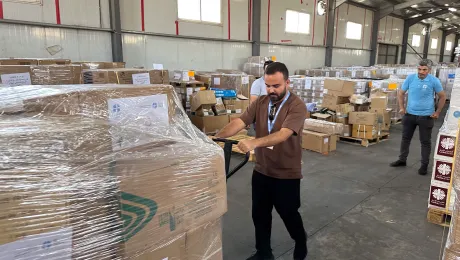Meet Musa and Esperance, two farmers in Burundi’s poorest province Cankuzo. An LWF development project helped them to improve their harvests and pay for food and health care.
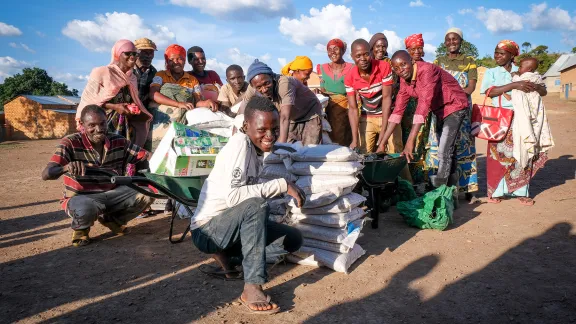
One of the cooperatives supported by LWF proudly show their harvest. Photo: LWF/ L. Gillabert
LWF supports farmers with tools, seeds, and training
(LWI) - His life has changed a lot in the past years, says Musa Ntakarutimana, a subsitence farmer in Misugi, a community in Burundi's Cankuzo province. The father of four used to farm on a small plot, the harvest was not enough to provide the family with food, clothing, healthcare and other essential items. In July 2020, the Lutheran World Federation (LWF) in Burundi established a project to support his community. It included seeds, training, and livestock, whose manure Musa used as fertilizer.
The new way of farming yielded three times as much as previous harvests, says Ntakarutimana, who today leads his community as president of the Haguruka Dukore ("Let's fly") cooperative: " I can really see the positive impact thanks to the training I received and the organic manure from the goats. My children eat enough of everything and are in good health," Ntakarutimana proudly says. "It used to be difficult to feed my family, but it's not a problem anymore. It was also hard to afford clothes, but now I have the money to buy them. I can look after my children when they fall ill".
A way out of poverty
Burundi is one of the least developed countries in the world, and Cankuzo, where Ntakarutimana lives, is the poorest province in Burundi. There needs to be more infrastructure, and socio-economic services are weak. The local farmers cannot count on much outside support. In addition, they share land and resources with refugees from the Democratic Republic of Congo, returnees, and internally displaced persons.
The region has experienced severe floods and droughts in the past years. Market prices have increased by 50 percent. An LWF survey at the beginning of the project showed that only five percent of the people in the project area have enough to eat.
It is with these communities that LWF has developed the Community Integrated Development Project. The main goal is to support the farmers and communities to be independent and enable them to grow their food. 2,751 families are part of the project, many can see how their lives have improved.
Empowering women
"Before the cooperative, I didn't know anything about modern farming techniques," says Espérance Nekoze, 26 years. The mother of fouris one of the leaders of the Turwizumwimbu N'ubukungu ("Let's increase production and have a surplus") cooperative in Mishiha, a community in Cankuzo province, north-eastern Burundi. She helps monitor the cooperative's finances and ensures all harvests are registered and stored in a safe place. She arranges meetings and activities and pays hired workers. Despite her young age, she is in a leadership position and makes decisions affecting almost 400 cooperative members.
I was isolated before, but now, I'm part of the community and can make an impact. Our family is stronger because we have enough food and can afford health care.
Esperance NEKOZE, Burundi
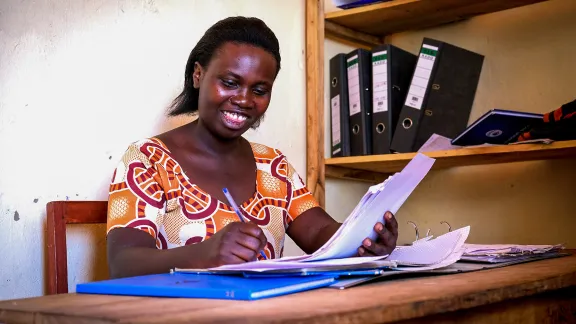
Esperance Nekoze notes the harvests in her cooperative. Photo: LWF/ L. Gillabert
Working in the cooperative and farming successfully gave her the confidence to take over this leadership position. "I've learned how to run a small business and grow corn using modern techniques," she says. More than that, the cooperative improved the situation of women in the community. "Before, women never left home, but now we're part of a group. I'm more esteemed in society because I'm part of the committee. I was isolated before, but now, I'm part of the community and can make an impact. Our family is stronger because we have enough food and can afford health care".
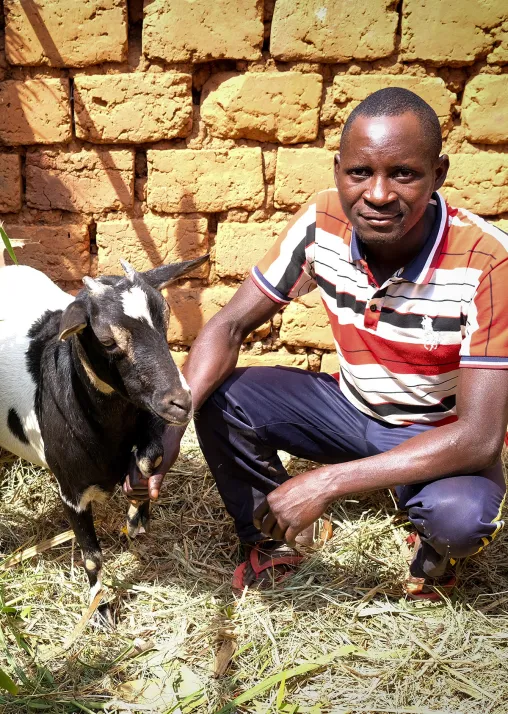
Musa Ntakarutimana and his goat. Photo: LWF/ L. Gillabert
Expansion plans
Three years after the start of the project, the farmer's cooperatives are thinking about ways to expand their production and market access. Ntakarutimana and Nekoze plan to buy more livestock and farm machines for the group. The biggest problem is storage – the old places are too small for the increased harvests.
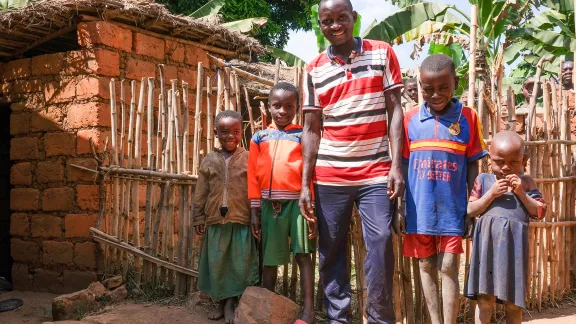
Musa Ntakarutimana and his children in front of his house. Photo: LWF/ L. Gillabert
LWF and the farmers of Cankuzo province are discussing the next steps to address these issues. Since the start of the co-operation, the energy in the group has changed : it is now full of hope for a better future. "I'm delighted with the project and that we were able to implement it with support from LWF ," Ntakarutimana concludes.
The Community Integrated development Project is supported by Australian Lutheran World service (ALWS).
LWF’s work in Burundi is also supported by the Canadian Foodgrains Bank, the German national Committee, the Evangelical Lutheran Church of America, and the Evangelical Church in Wurttemberg.
